Memorial restoration uncovers WW II history of 'Newfoundland's most bereaved mother'
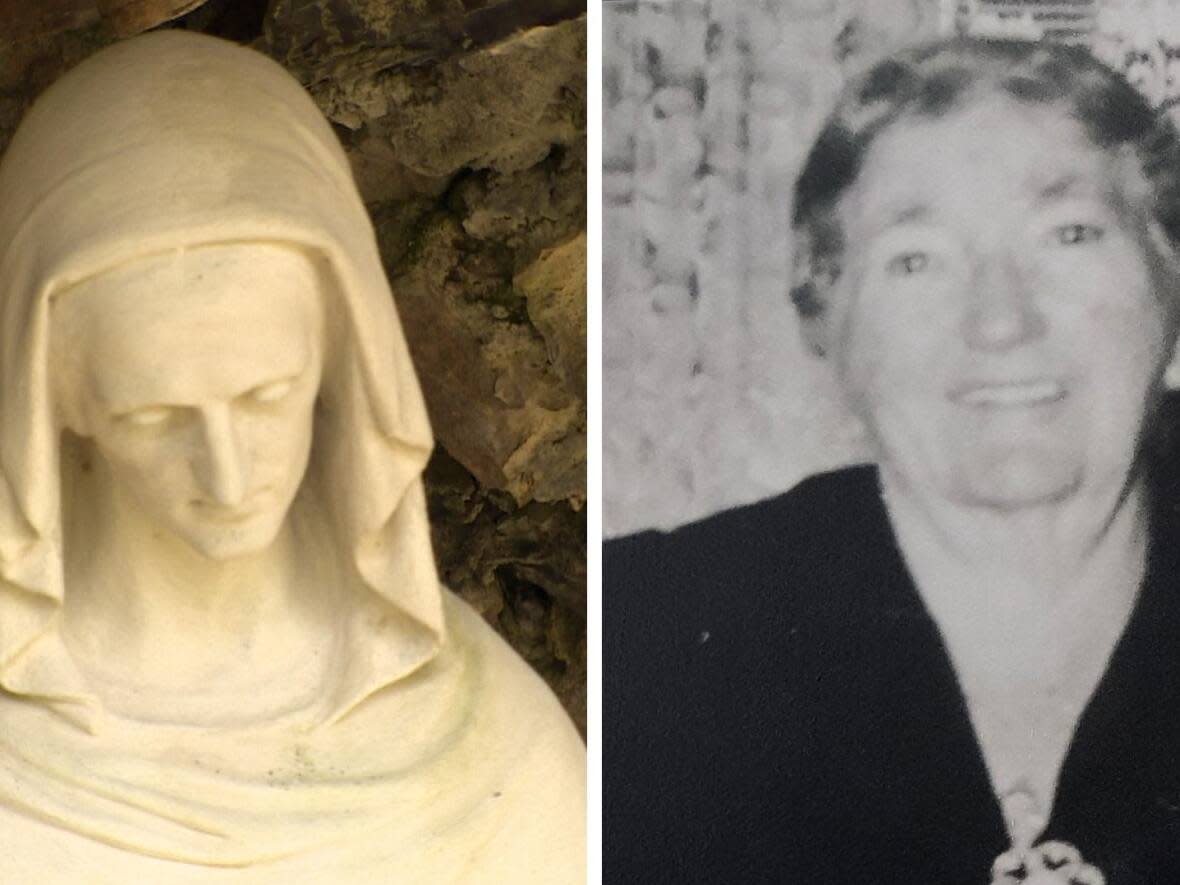
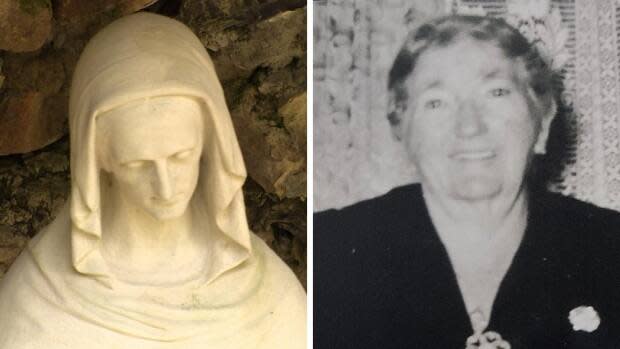
There are different kinds of casualties of war. There are those who died in the fighting, but there are also those left behind, in some way shattered by the losses they endured. This is the story of a memorial to both..
Margaret O'Brien of Outer Cove — recognized in a plaque on Signal Hill Road in St. John's as Newfoundland's "Most bereaved mother for World War II" — lost four sons during World War II, as well as her husband, Maurice, who died suddenly after news of the death of their third son, James.
Now a newly restored memorial in the town is preserving her family's story for future generations.
The memorial grotto is a free-standing stone structure, with a statue of Anne, the patron saint of mothers, resting on a pillar displaying the names of the O'Brien men who died in the war.
O'Brien herself paid for its creation in the 1950s, but in recent years it had fallen into disrepair.
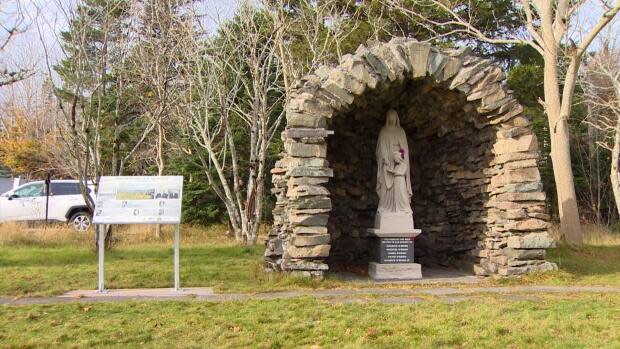
John Kennedy, former mayor and current president of the Veterans Memorial Committee of Logy Bay-Middle Cove-Outer Cove, recalls growing up in the community with no idea as to what the memorial stood for.
"I left the house every day, I walked past that grotto to get to the school. I had no idea," Kennedy told CBC News.
"It wasn't widely known. I couldn't believe it. The first thing that struck me was, I said if this was in the States this would've been highly publicized. There would've been books written about this, and this is almost gone."
The committee decided to restore the grotto, raising money entirely though fundraisers within the community.
Kennedy says they found its foundations had shifted, rendering the structure unstable and leaving the statue of St. Anne badly damaged.
The town partnered with the Grand Concourse Authority to stabilize the foundation and restore the grotto and statue to its original condition.
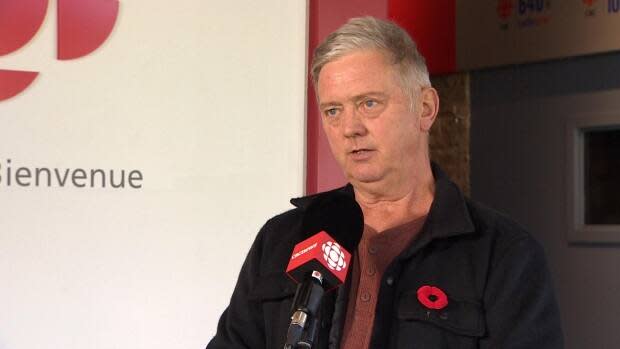
But a new problem arose during the reconstruction. The grotto sits on the grounds of St. Francis of Assisi Roman Catholic Church in Outer Cove, a property in the process of being sold as part of a settlement of sexual abuse claims related to the Mount Cashel Orphanage.
Kennedy says both the COVID-19 pandemic and the sale of the churches caused delays in the restoration. The committee contemplated moving the grotto entirely at one point but it turn out to be unnecessary.
"We were very lucky in that the company that bought the church donated it back to the parish," said Kennedy.
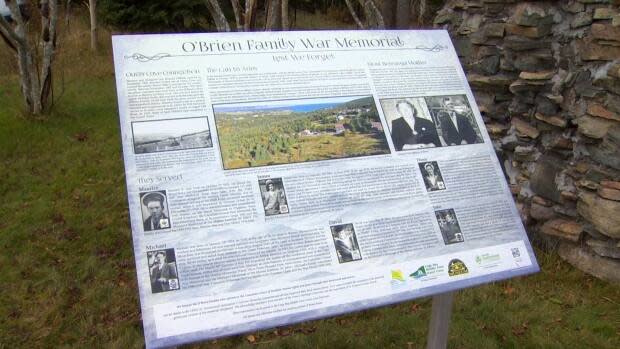
But fixing the memorial was only part of the project. Kennedy says they also wanted to ensure the town remembered why it was there, so they set about creating a storyboard to be displayed nearby.
Four of the six O'Brien sons were killed during the war. Maurice Jr, who served with the Royal Navy and Michael who worked on an American merchant ship both had their vessels torpedoed by U-boats. David, serving with Royal Navy Auxiliary, drowned in St. John's Harbour in what was ruled an accident.
During the committee's research for the memorial, the story of James, the third son lost, took an unexpected turn. Kennedy says what their researcher Dale Russell Fitzpatrick discovered "floored" them.
"The family thought he was lost at sea. She came back with detailed account of what had happened to him [and] a picture of his grave site."
James was with the American merchant marine, aboard the SS Ballot as part of Convoy PQ13. During the war, the Arctic convoys were tasked with getting Allied supplies to the Soviet Union, in support of Russia's war effort against Germany on the eastern front, running a brutal gauntlet of U-boats, mines, air bombers and the unrelenting Arctic cold.
The Ballot was bombed, as the family had believed, but that wasn't the end of James's story.
He was one of 15 crew members to survive in lifeboats, and was picked up and placed aboard the SS Induna, but this ship too was sunk days later, and once again James ended up in a lifeboat.
He spent days injured and exposed to the icy Arctic Ocean before being picked up by a Russian minesweeper, but sadly died in a Murmansk hospital a week later and remains buried nearby.
Kennedy says the family was shocked by the news.
"They were relieved that they knew what had happened," he says. "They were sad that James's mother never did find out. But at least now they've got a place they know he's at rest."
Margaret O'Brien remained proud of her family's service throughout her life, but her surviving family recalled a sadness she always carried as well, until her death in 1963.
Now fully restored and archived, the story of O'Brien family will live on in their own community and in The Rooms provincial archives.
"The two most important things about this story," says Kennedy, "was one, that the family found out what happened. And two, that all the information that Dale has gathered, which is volumes, are going to be stored at our town's museum and also at The Rooms.
"So they're preserved. They're like the grotto. The grotto is being preserved so that it doesn't actually fall down. And the story of what happened to these men? That's preserved."
Read more from CBC Newfoundland and Labrador


